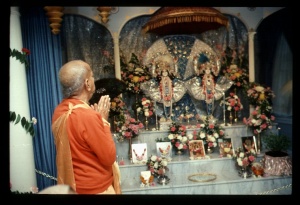SB 10.12.13

A.C. Bhaktivedanta Swami Prabhupada
TEXT 13
- athāgha-nāmābhyapatan mahāsuras
- teṣāṁ sukha-krīḍana-vīkṣaṇākṣamaḥ
- nityaṁ yad-antar nija-jīvitepsubhiḥ
- pītāmṛtair apy amaraiḥ pratīkṣyate
SYNONYMS
atha — thereafter; agha-nāma — a very powerful demon by the name Agha; abhyapatat — appeared on the spot; mahā-asuraḥ — a great, extremely powerful demon; teṣām — of the cowherd boys; sukha-krīḍana — the enjoyment of their transcendental pastimes; vīkṣaṇa-akṣamaḥ — being unable to see, he could not tolerate the transcendental happiness of the cowherd boys; nityam — perpetually; yat-antaḥ — the end of the life of Aghāsura; nija-jīvita-īpsubhiḥ — just to live undisturbed by Aghāsura; pīta-amṛtaiḥ api — although they drank nectar every day; amaraiḥ — by such demigods; pratīkṣyate — was also being awaited (the demigods were also awaiting the death of the great demon Aghāsura).
TRANSLATION
My dear King Parīkṣit, thereafter there appeared a great demon named Aghāsura, whose death was being awaited even by the demigods. The demigods drank nectar every day, but still they feared this great demon and awaited his death. This demon could not tolerate the transcendental pleasure being enjoyed in the forest by the cowherd boys.
PURPORT
One may ask how Kṛṣṇa's pastimes could be interrupted by a demon. Śrīla Viśvanātha Cakravartī Ṭhākura answers this question by saying that although the transcendental pleasure being enjoyed by the cowherd boys could not be stopped, unless they stopped the transcendental pleasure of their various activities they could not eat their lunch. Therefore at lunchtime Aghāsura appeared by the arrangement of yogamāyā, so that for the time being they could stop their activities and take lunch. Changing varieties are the mother of enjoyment. The cowherd boys would continuously play, then stop, and then again enjoy in a different way. Therefore every day a demon would come and interrupt their sporting pastimes. The demon would be killed, and then the boys would engage again in their transcendental pastimes.